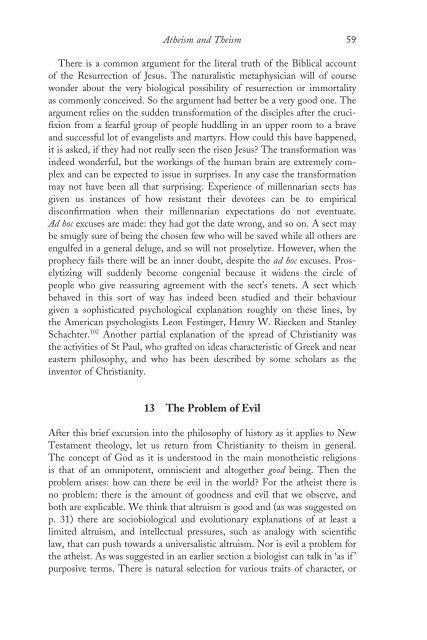Atheism and Theism JJ Haldane - Common Sense Atheism
Atheism and Theism JJ Haldane - Common Sense Atheism
Atheism and Theism JJ Haldane - Common Sense Atheism
Create successful ePaper yourself
Turn your PDF publications into a flip-book with our unique Google optimized e-Paper software.
<strong>Atheism</strong> <strong>and</strong> <strong>Theism</strong> 59<br />
There is a common argument for the literal truth of the Biblical account<br />
of the Resurrection of Jesus. The naturalistic metaphysician will of course<br />
wonder about the very biological possibility of resurrection or immortality<br />
as commonly conceived. So the argument had better be a very good one. The<br />
argument relies on the sudden transformation of the disciples after the crucifixion<br />
from a fearful group of people huddling in an upper room to a brave<br />
<strong>and</strong> successful lot of evangelists <strong>and</strong> martyrs. How could this have happened,<br />
it is asked, if they had not really seen the risen Jesus? The transformation was<br />
indeed wonderful, but the workings of the human brain are extremely complex<br />
<strong>and</strong> can be expected to issue in surprises. In any case the transformation<br />
may not have been all that surprising. Experience of millennarian sects has<br />
given us instances of how resistant their devotees can be to empirical<br />
disconfirmation when their millennarian expectations do not eventuate.<br />
Ad hoc excuses are made: they had got the date wrong, <strong>and</strong> so on. A sect may<br />
be smugly sure of being the chosen few who will be saved while all others are<br />
engulfed in a general deluge, <strong>and</strong> so will not proselytize. However, when the<br />
prophecy fails there will be an inner doubt, despite the ad hoc excuses. Proselytizing<br />
will suddenly become congenial because it widens the circle of<br />
people who give reassuring agreement with the sect’s tenets. A sect which<br />
behaved in this sort of way has indeed been studied <strong>and</strong> their behaviour<br />
given a sophisticated psychological explanation roughly on these lines, by<br />
the American psychologists Leon Festinger, Henry W. Riecken <strong>and</strong> Stanley<br />
Schachter. 102 Another partial explanation of the spread of Christianity was<br />
the activities of St Paul, who grafted on ideas characteristic of Greek <strong>and</strong> near<br />
eastern philosophy, <strong>and</strong> who has been described by some scholars as the<br />
inventor of Christianity.<br />
13 The Problem of Evil<br />
After this brief excursion into the philosophy of history as it applies to New<br />
Testament theology, let us return from Christianity to theism in general.<br />
The concept of God as it is understood in the main monotheistic religions<br />
is that of an omnipotent, omniscient <strong>and</strong> altogether good being. Then the<br />
problem arises: how can there be evil in the world? For the atheist there is<br />
no problem: there is the amount of goodness <strong>and</strong> evil that we observe, <strong>and</strong><br />
both are explicable. We think that altruism is good <strong>and</strong> (as was suggested on<br />
p. 31) there are sociobiological <strong>and</strong> evolutionary explanations of at least a<br />
limited altruism, <strong>and</strong> intellectual pressures, such as analogy with scientific<br />
law, that can push towards a universalistic altruism. Nor is evil a problem for<br />
the atheist. As was suggested in an earlier section a biologist can talk in ‘as if ’<br />
purposive terms. There is natural selection for various traits of character, or

















